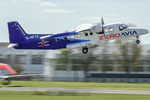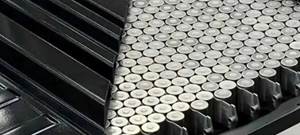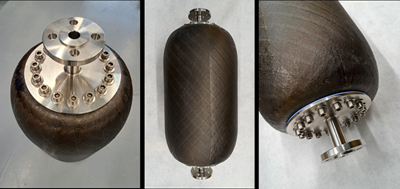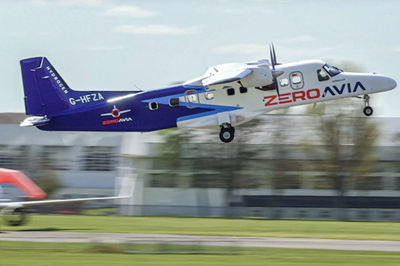Joby demonstrator makes 523-mile hydrogen-electric flight
Hydrogen-electric program builds on technology developed by H2FLY subsidiary, demonstrates potential for emissions-free regional travel using Joby’s all-composite eVTOL aircraft.
Joby Aviation (Santa Cruz, Calif., U.S.) has successfully flown a hydrogen-electric air taxi demonstrator 523 miles, with water as the only byproduct. The aircraft, which takes off and lands vertically (VTOL), builds on Joby’s successful battery-electric air taxi development program, and demonstrates the potential for hydrogen to unlock emissions-free, regional journeys that don’t require a runway.
While the demonstrator is all-composite — it being the same eVTOL Joby is working to certify with the FAA — Joby is not yet able to reveal material use behind the aircraft’s liquid hydrogen (LH2) tanks.
“The vast majority of the design, testing and certification work we’ve completed on our battery-electric aircraft carries over to commercializing hydrogen-electric flight,” says JoeBen Bevirt, founder and CEO, Joby. “In service, we also expect to be able to use the same landing pads, the same operations team and Joby’s ElevateOS software that will support the commercial operation of our battery-electric aircraft.”
The landmark test flight, believed to be the first forward flight of a VTOL aircraft powered by LH2, was completed in June using a converted Joby pre-production prototype battery-electric aircraft fitted with an LH2 fuel tank and fuel cell system. It landed with 10% of its hydrogen fuel load remaining.
“Agility Prime has been very supportive of hydrogen-powered aircraft development and testing as it aligns with the program’s goals to advance transformative vertical lift technologies and broader Department of Defense operational energy goals of energy substitution and diversification, and energy demand reduction,” notes Jacob Wilson, (acting) branch chief, AFWERX Agility Prime.
Joby’s hydrogen-electric demonstrator is part of the company’s future technology program and is the result of several years of collaboration between a small team at Joby and H2FLY, Joby’s wholly owned subsidiary based in Stuttgart, Germany. The converted aircraft previously completed more than 25,000 miles of testing as a battery-electric aircraft at Joby’s base in Marina, California.
Using the same airframe and overall architecture as Joby’s core, battery-electric aircraft, this demonstrator features a LH2 fuel tank, designed and built by Joby, which stores up to 40 kilograms of LH2, alongside a reduced mass of batteries. Hydrogen is fed into a fuel cell system, designed and built by H2FLY, to produce electricity, water and heat. The electricity produced by the hydrogen fuel cell powers the six electric motors on the Joby aircraft, with the batteries providing additional power primarily during takeoff and landing.
Joby’s H2FLY team used similar technology to complete another record-breaking flight in September 2023, when it performed a piloted flight of a conventional LH2-electric aircraft using the company’s fuel cell technology.
Joby plans to start commercial operations as soon as 2025, using its battery-electric air taxi.
Related Content
OVERLEAF tackles thermoplastics, open cell insulation, sensors and testing for LH2 tank
Newsletter #4 gives latest status on EU project’s work toward thermoplastic composite tanks with 40% storage density of cryogenic hydrogen for future zero emissions aircraft.
Read MoreUpdate: THOR project for industrialized, recyclable thermoplastic composite tanks for hydrogen storage
A look into the tape/liner materials, LATW/recycling processes, design software and new equipment toward commercialization of Type 4.5 tanks.
Read MoreComposites end markets: Batteries and fuel cells (2024)
As the number of battery and fuel cell electric vehicles (EVs) grows, so do the opportunities for composites in battery enclosures and components for fuel cells.
Read MoreHonda begins production of 2025 CR-V e:FCEV with Type 4 hydrogen tanks in U.S.
Model includes new technologies produced at Performance Manufacturing Center (PMC) in Marysville, Ohio, which is part of Honda hydrogen business strategy that includes Class 8 trucks.
Read MoreRead Next
NCC composite cryogenic tanks successfully tested with LH2
Thirty-liter single-piece and split-piece tank constructions underwent various pressures and test cycles while maintaining full integrity. End boss design testing is underway.
Read MoreZeroAvia partners with Verne to explore CcH2 storage
Having recently demonstrated a Type III CcH2 system, Verne will work with ZeroAvia to assess the benefits of scaling CcH2 storage and refueling infrastructure at airports globally.
Read MoreUltrasonic welding for in-space manufacturing of CFRTP
Agile Ultrasonics and NASA trial robotic-compatible carbon fiber-reinforced thermoplastic ultrasonic welding technology for space structures.
Read More



























